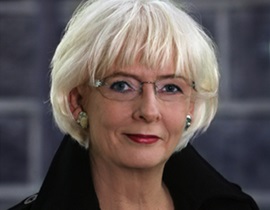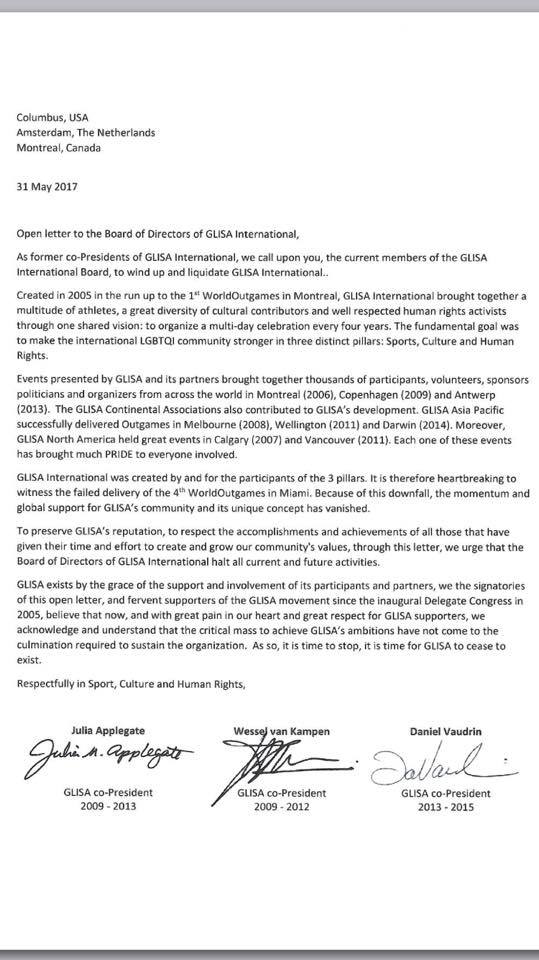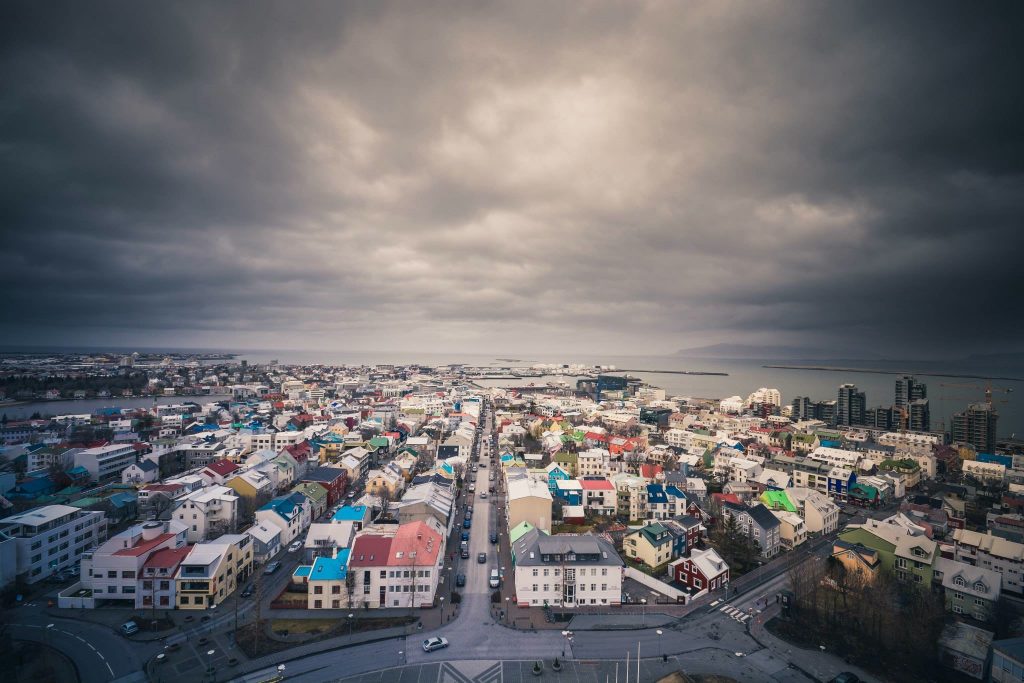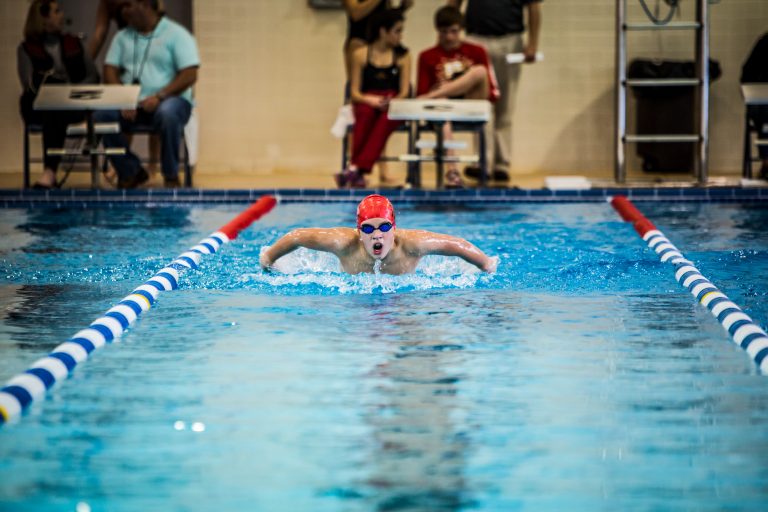Outrage has replaced the OutGames after the 2017 World OutGames planned to take place in Miami this week were cancelled last minute. Former board co-Presidents of GLISA, Gay and Lesbian International Sports Association, have called upon the current members to dissolve the association and halt all current and future activities.
“I fear it‘s all over for GLISA, it‘s the end of the World OutGames,“ says the project manager of the bid of Reykjavík City, which competed with Miami over hosting the 2017 games.
Due to disappointing numbers of registrations and financial woes the event’s organizers announced the games had been cancelled, just 24 hours before the opening ceremony scheduled for the 26th of May.

“It is with deep regret that due to financial challenges, World OutGames must cancel opening and closing ceremonies and sports programming with the exception of aquatics, country western dance and soccer. The Human Rights Conference and cultural programs will continue as planned. We thank everyone who has supported the effort and apologize to those who will be impacted by this difficult decision,” read an announcement sent to everybody involved, including participants who some were already in Miami or on their way there.
Ingi Thor Busk, who was event manager at Reykjavík City in 2013 when the bids took place, says the gay community is outraged. “This is scandalous; people feel cheated because what’s happened didn’t just happen. It was obvious long time ago that this tournament was never going to kick off.”
Ingi says that Reykjavík City decided to bid for the 2017 OutGames after receiving enquiries and encouragement from members of the gay community all over the world. “This was a huge process that started in 2012 and we put a lot of work into it.”
“I think they really wanted to bring the OutGames to the United States at almost any cost. But … it was obvious that the organizers were in over their heads; GLISA should have cancelled this in January the latest.”
The bid was thoroughly prepared in collaboration or with the support of the most significant government bodies as well as human rights bodies and consultants such as the manager of ÍSÍ (The National Olympic and Sports Association of Iceland), the mayor of Reykjavík, the President of Iceland, the then prime minister of Iceland, openly gay Jóhanna Sigurðardóttir, and her cabinet, The Minister of Culture ,VisitReykjavík, Meetin Reykjavík, Reykjavik Human Rights Office, Samtökin ’78, Pink Iceland Travel Agency, Saga Film, KPMG and more.
“We did a very thorough job and spent weeks and months of preparing an awesome bid with an honest presentation,” Ingi recalls.
Six cities initially applied for hosting the 2017 OutGames but only two made it to the short list, Reykjavík and Miami Beach.

“We never doubted we’d be shortlisted; no other city was offering what we could because we had the government, the city council and some major organizations and institutes behind us,” Ingi says, adding that Miami Beach didn’t offer anything like that.
“They had nothing; their bid was badly structured and their presentation, I am told, awful. When the decision was made in Antwerp, my team presented our bid first and then of course left the meeting room while Miami did theirs. And while we were waiting there outside, we saw people just leaving, they said the presentation was bad and that their bid was awful.”
One of many things that Reykjavík could offer was a safe environment for the LGBTQI athletes, whereas a city such as Miami – which is in top 20 when it comes to US cities with the highest crime rates – would need to take more extreme measures in securing the safety of the participants. “But when they were asked about that, they had no answers. It was as if it hadn’t even occurred to them that security was something that people would be very concerned about, you know, LGBTQI people getting together in a US city. It was unbelievable, they hadn’t thought of that!” Ingi says, obviously still stunned by that; after all, Florida state is rather accommodating to guns whereas not even police officers in Iceland carry firearm.
And yet, Miami Beach eventually won the bid, which surprised many, not only the Icelandic project team in Antwerp, according to Ingi. “The way it works is that members of GLISA (Gay and Lesbian International Association) all over the world, watch the online broadcast from the presentations and then everybody casts a vote. We have
“When the decision was made in Antwerp, my team presented our bid first and then … Miami did theirs … They had nothing; their bid was badly structured and their presentation, I am told, awful.”
to take into account that the only Icelandic members of GLISA was Pink Iceland so there was only one Icelandic vote; perhaps that was our mistake, we should have secured more Icelandic votes because apparently, it was very close.”
Ingi says there have been rumours since about how Miami Beach won the bid but he doesn’t want to comment on that publicly. He believes the biggest fault lies with the GLISA board. “I think they really wanted to bring the OutGames to the United States at almost any cost. But they should have seen from the start that this was never going to work out. And they should have cancelled the event long time ago, it was obvious that the organizers were in over their heads; GLISA should have cancelled this in January the latest.”
According to the Miami Herald, shortly after GLISA announced the cancellation of the 2017 World OutGames, Miami Beach Police and the State Attorney’s Office announced they were opening a fraud investigation.

But Ingi says the whole idea was faulty from the start. “I, personally, never had any faith in the bid from Miami Beach. I hope I don’t sound bitter or angry but I said to my team when we were in Antwerp that if Miami Beach would win the bid, it would mean the end for GLISA and the World OutGames. You can quote me on that; I was just so certain that they’d never pull this off.” And unfortunately Ingi may have been right. People are bothered and hurt after the cancellation of the games and Ingi says it looks as though GLISA’s reputation is ruined. “There’s no respect or trust left.”
He adds that LGBTQI athletes in general were simply not keen on going to Miami for the games. “And it didn’t help when Donald Trump was voted president. None of us are going to pop over to the States just for fun these days, especially those of us who are fighting for equality and human rights; we’re not going to put our money into the US economy.”
The few participants who had made plans to travel to, or had already travelled to Miami are not happy and expect to be compensated. The LGBTI sports society is fuming, this is not a hiccup that GLISA can easily get rid of, this is a mammoth sized scandal and at the moment, hardly anyone believes that the 2021 World OutGames will take place in Buenos Aires.
In fact, three former co-Presidents of GLISA issued a statement on Wednesday, urging the current presidents to put GLISA out of its misery; wind up and liquidate GLISA International. They stress that the association was formed in 2005 to make the international LGBTQI community stronger in three areas: sports, culture and human rights.
“GLISA International was created by and for the participants of the 3 pillars. It is therefore heartbreaking to witness the failed delivery of the 4th WorldOutGames in Miami. Because of this downfall, the momentum and global support for GLISA’s community and its unique concept has vanished.”

“This is just horrendous. You want to be angry at someone but there’s not really anyone to be angry at,” says Ingi. “First and foremost, I’m incredibly sad, it’s such a shame this happened, and after all the work we’ve done. We should all be in Reykjavík right now, celebrating and doing amazing things. But that’s never going to happen now.”
Had the World OutGames be held in Reykjavík, the organizers would have anticipated 8-10,000 participants from all over the world. “It would have been so festive, we would have had all the main events in the same area, Laugardalur, so there would only have taken a few minutes to transport between venues, all participants would have been accommodated in Reykjavík which is a small city and they would all have been able to be treated like first class citizens. I have no doubt that we could have shown what a model city Reykjavík is in terms of respect for people and human rights. Or as we said in our presentation: “In Iceland we don’t tolerate you, we celebrate you!” This is such a tragic end to something that could have been so great.”
Main photo: www.pexels.com


